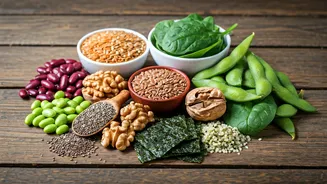Introduction: Omega-3s
Omega-3 fatty acids are essential fats crucial for optimal health, notably cardiovascular well-being. These fats, which the body cannot produce on its
own, are often obtained through diet. Including foods rich in Omega-3s can significantly reduce the risk of heart disease by lowering triglycerides, reducing blood pressure, and preventing the formation of blood clots. This article focuses on vegetarian sources. The fitness coach recommends foods to help meet a goal of 100 grams of protein daily, and these suggestions extend to heart health as well. Integrating these foods into your diet is a straightforward way to protect your heart.
Chia Seeds Power
Chia seeds are tiny, but mighty, powerhouses of Omega-3s. A few tablespoons of chia seeds provide a substantial dose of alpha-linolenic acid (ALA), a type of Omega-3. These seeds are versatile. They can be added to smoothies, sprinkled on salads, or mixed into yogurt. Beyond their Omega-3 content, chia seeds also provide fiber, antioxidants, and minerals. Incorporating chia seeds into your daily meals offers a simple way to boost your heart health. Regular consumption has been associated with improved cholesterol levels, promoting a healthier heart.
Flaxseeds for Health
Flaxseeds, like chia seeds, are an excellent source of ALA. Consuming flaxseeds is an easy way to increase your Omega-3 intake. They are also packed with fiber and lignans, which have antioxidant properties. Ground flaxseeds are easier for the body to digest and absorb the nutrients. Sprinkle them on your breakfast cereal, add them to baked goods, or mix them into your oatmeal. Their nutty flavor makes them a great addition to almost any dish. Flaxseeds contribute to heart health and offer a wide range of additional benefits, including improved digestion and reduced inflammation.
Walnuts: A Nutty Choice
Walnuts are delicious and a convenient source of Omega-3 fatty acids. A handful of walnuts offers a healthy dose of ALA. They are a versatile snack and can be added to salads, pasta dishes, or enjoyed on their own. Walnuts provide a satisfying crunch and a rich flavor. Along with their Omega-3 content, walnuts are rich in antioxidants and other nutrients. This combination makes them a fantastic food for heart health. Regular consumption of walnuts has been linked to lower levels of bad cholesterol and improved overall cardiovascular health.
Hemp Seeds Benefit
Hemp seeds are another excellent plant-based source of Omega-3 fatty acids. They provide a balanced ratio of Omega-3 and Omega-6 fatty acids, along with protein and other essential nutrients. Hemp seeds have a mild, nutty flavor, making them easy to incorporate into various dishes. You can add them to smoothies, sprinkle them on salads, or mix them into granola. Hemp seeds can contribute to heart health and provide a boost of energy. Consider them as an easy way to add essential nutrients to your daily diet.
Edamame Goodness
Edamame, or young soybeans, is a protein-packed and nutritious food. Edamame offers a healthy dose of Omega-3 fatty acids. Enjoy them as a snack, add them to salads, or include them in stir-fries. They are a versatile and tasty addition to your diet. Edamame is a good source of fiber, vitamins, and minerals. This makes them a great food choice for overall well-being. Eating edamame can help lower cholesterol levels and support heart health.
Seaweed's Advantage
Seaweed, such as nori and kelp, is a unique vegetarian source of Omega-3s. While the ALA content may vary, seaweed offers many other health benefits. Seaweed is a nutrient-dense food, packed with vitamins, minerals, and antioxidants. It can be added to soups, salads, and sushi. Seaweed offers a unique and healthy way to boost your diet. By integrating seaweed into your diet, you provide your body with valuable nutrients. Seaweed promotes heart health and overall well-being.
Brussels Sprouts Help
Brussels sprouts, often overlooked, are a good source of ALA Omega-3 fatty acids. These cruciferous vegetables are also rich in fiber, vitamins, and antioxidants. Roasting, steaming, or sautéing them enhances their flavor. Brussels sprouts are not only delicious but also highly nutritious. They support heart health, aid in digestion, and offer various health benefits. Make these a regular part of your meals for a nutritious boost. Their inclusion in your diet will aid in maintaining a healthier lifestyle.
Soybean Oil Benefits
Soybean oil is an affordable and widely available source of ALA Omega-3s. Using soybean oil in your cooking can help boost your Omega-3 intake. This oil is versatile and can be used in various cooking methods, from sautéing to baking. Consider using it in your salad dressings as well. Soybeans are a rich source of nutrients. Soybean oil consumption is good for your heart and supports overall health. Soybean oil provides a practical and accessible way to incorporate heart-healthy fats into your daily diet.
Vegetable Oils Explained
Several vegetable oils, besides soybean oil, contain Omega-3 fatty acids. These include canola oil and flaxseed oil. They can all contribute to heart health. Using these oils in cooking or as salad dressings is a simple way to increase your Omega-3 intake. Vegetable oils offer versatility in the kitchen. Make sure to choose high-quality oils. Vegetable oils can enhance your diet, improve heart health, and contribute to overall wellness. Including them in your meals will have a significant positive impact.




















